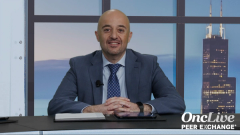
The Future of Myeloproliferative Neoplasm Treatment
The panelists conclude their discussion by highlighting investigational agents to look forward to.
Episodes in this series

Rami Komrokji, MD: Before we conclude, I’ll ask everyone for their final thoughts. Jeanne?
Jeanne Palmer, MD: We’ve been able to review a lot of information today. In ET [essential thrombocythemia], PV [polycythemia vera], and MF [myelofibrosis], we have a lot of therapies coming down the pipeline and approved, which has changed the way we look at and treat these patients. It’s important to make sure that we’re thinking of the big picture and learning about these new therapies and utilizing them.
Rami Komrokji, MD: Absolutely. Ruben?
Ruben Mesa, MD: I’m incredibly hopeful. We’ve evolved from the first 15 years of my career, where we were trying to use drugs from other indications that largely weren’t overly active, to 15 years of drugs specifically designed to try to have an impact in MPNs [myeloproliferative neoplasms]. We’ve made great progress. We now have 4 new approved drugs, between ruxolitinib, fedratinib, pacritinib, and ropegylated interferon. We have a raft of others, both a single agent and a combination in phase 3 trials. All of that will benefit our patients to a much greater degree.
We’re learning from our colleagues. We’ve just come from the ASCO [American Society of Clinical Oncology] annual meeting. With most diseases, we don’t treat with a single drug. Whether we’re talking about solid tumors, myeloma, CLL [chronic lymphocytic leukemia], or lymphoma, it’s combinations, subtlety, and precision medicine that’s mindful of the patient, their circumstance, health equity, and the biology of their disease. It’s exciting to see MPNs mature, like the other diseases have matured.
Rami Komrokji, MD: Absolutely. And Jamile?
Jamile Shammo, MD, FACP, FASCP: I’d like to say that perhaps the age of stagnation is going to be over very soon, because there are a lot of new drugs, new developments, and a lot of hope. It’s exciting.
Rami Komrokji, MD: Thank you for joining us. We hope you found this OncLive® Peer Exchange discussion to be useful and valuable to the treatment of your patients with myeloproliferative neoplasms.
Transcript edited for clarity.







































